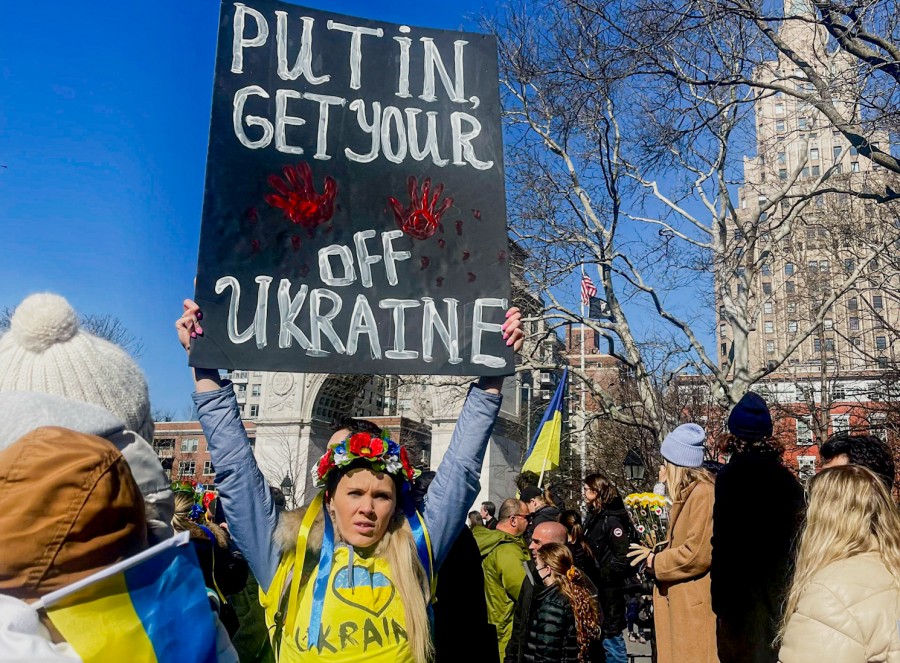Guest Essay: The despair of anti-war Russians
It is important to not conflate the actions of the Russian government with Russian people. Here at NYU, many Russian students oppose the war in Ukraine.
Amid the ongoing war between Russia and Ukraine, Russian NYU students are standing against the actions of the Russian government. (Image courtesy of Alexandra Azarova)
April 22, 2022
Alexandra Azarova is a Russian CAS sophomore.
I am writing on behalf of the community of Russians at NYU against the war in Ukraine. Pro-peace Russian students at NYU want to highlight that the Russian government does not represent all of the Russian people.
Russians are obligated to carry a degree of responsibility for the actions of the Russian regime. Many would argue that Russians should have spoken up more to prevent this from ever happening in the first place. They would say it is incumbent upon us now to spread awareness about what is happening in this incomprehensible war in our part of the world.
But the harsh reality is that I, along with all the other Russians that support democracy and peace, have little say in the matter. The civil rights and freedoms that those in the West may take for granted do not exist in Russia.
Propaganda has crept into every Russian home, with media channels like First and Evening Moscow justifying war crimes that are being committed against Ukraine. President Vladimir Putin’s regime has rationalized the war in Ukraine with two main justifications, both of which are founded upon vile falsehoods.
The first is that Russian aggression is somehow a form of liberation for people living in Ukraine. The second reason is Putin’s fear that Ukraine’s intentions of joining NATO, an intergovernmental military alliance, would present an existential threat to Russia’s dominance, a proposition possibly even more baseless than the previous claim. As a sovereign nation, Ukraine has the right to associate with any foreign alliances that it so chooses. If that means allying with the West, then so be it — Russia should have absolutely no say.
The war rests on a truly daft premise: If Ukraine were to join NATO, a great threat would sit at Russia’s doorstep — the U.S. military. This hypothetical alliance serves as one of the sole rationalizations for this war.
Unfortunately, it is profoundly difficult for ordinary Russians to access the truth, not only because Putin’s propaganda machine continues to proliferate harmful narratives, but also because of the government’s suppression of opposition.
Many liberal news sources like Meduza and Dozhd have been censored by the government in the past month; Instagram, Facebook, and Google News have been blocked. The suppression of foreign digital influences will only create more resentment among the Russian public toward the rest of the world.
It is evident that a “cancel culture” against anything even remotely tied to Russia or Russians has already emerged in America. Americans are woefully unaware that removing these links to Russian culture does nothing except harm Russians in America, many of whom vehemently oppose the Putin regime, further intensifying the cultural rift between Russia and the West.
Americans’ antagonisms against individual Russians is complicated for me; I am a Russian student in New York City, a place that claims to welcome all immigrants. The Russian government does not represent the views of many Russian people, and I, like many of my Russian peers at NYU, have been among those most vocally against this brutal conflict. Why are individual Russians receiving backlash when we are doing whatever we can to oppose the war? It was none other than the NYU Russian Culture Club that organized protests in Washington Square Park, raising funds and increasing awareness about the situation in Ukraine.
Regardless, we, the minority of the nation that supports fair elections and freedom of speech, will be the ones who suffer the consequences, accepting the blame for a government that fails to represent us in any real capacity.
Recently, I’ve observed that many of my fellow Russians here have not only felt threatened solely because of our nationality, but that some have even begun to feel ashamed of their cultural origins. I wholeheartedly reject that sentiment because it only strengthens the preposterous association between the Russian people and the heinous crimes of Putin, something that must be destroyed. The Russian people have no obligation to accept the burden of the atrocities committed by Putin, especially given that many Russians living in America oppose the war to begin with. I cannot imagine a reality in which I’d be ashamed of being Russian.
While students at NYU have the invaluable privilege of being able to criticize their own government to their heart’s content, students in Moscow are facing expulsions from universities because of their involvement in protests. While students at NYU have the right to assemble and conduct protests on these very issues, students in Moscow are being arrested and beaten in the streets when they try speaking out against their atrocious regime.
It hurts deeply to watch your home country sink into an economic, cultural and reputational depression, to be detached from the rest of the world and to become a global embarrassment, all because of the acts of one man who fails to represent the beliefs of myself and many of my fellow Russians. Putin’s regime is not only destroying Ukrainian lives, but also the lives of Russians living in their own country and Russians around the world.
This brings me to the question that has kept me up at night: How can Putin possibly justify a war that harms both Russians and Ukrainians?
WSN’s Opinion section strives to publish ideas worth discussing. The views presented in the Opinion section are not the views of the Washington Square News.
Contact Alexandra Azarova at [email protected].

























































































































































Frodo • Apr 22, 2022 at 5:34 pm
Proud of you. Great job!